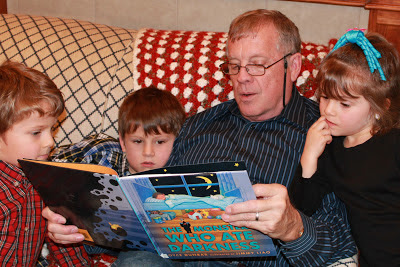"Fuh-uh-nuh. Fun."
"Buh-uh-nuh. Bun."
If she hears slippered feet pad across the floor, the music of her learning will stop in self-consciousness. And so, I simply sit, listen to this little one sitting upright on her bed, spindly legs and feet under blankets of pink and sparkly butterflies as she waits for daddy to come say nightly prayers and kiss her goodnight.
"Buh-eh-ll. Bell"
"Ssss.aaa.t. Sat."
One by one, she rhythmically goes through a list of words, sounds, always a series of two consonants separated by one vowel.
I smile, thank God that something is sinking into that head, the one that fears what she doesn't already know how to do, just like her mother.
Just today, she and I both had another meltdown over her reading lesson, something I thought we had gotten past weeks ago. We'd been taking it slow and making great progress. The day before, we had celebrated completing the fiftieth lesson, halfway through the book.
But today, her genetically-acquired fear of failure reared its ugly head again as I gently prodded her to repeat the sounds so she could figure out the new word. The corners of her lips turned downward and quivered intentionally with fussiness. As her I-can't-do-it attitude huffed towards my razor thin kindness, I snapped.
We three had been out early for a trip to the dentist, the pharmacy for brother's vitamins, and the weekly library run for fifteen books and story time's much-anticipated craft. Two boys were coming over in one hour for a writing lesson, and I was trying to sneak in the twins' reading lesson before lunch, knowing the relationship-destroying hurricanes that swirl when I try to do lessons in the afternoons.
This was the very kind of confrontation I was trying to avoid because I want her to associate reading with fun, laughter, imagination, and the key to all knowledge.
But I was rushing. I guess she could tell, could feel it even as I tried to speak slowly the lilting soundtrack of fun that I repeat whenever we're doing the lessons I know are more difficult for her than for her brother.
Frustrated with each other, we both took a time out.
Minutes later when I called her back to the table, it was obvious her attitude still hadn't changed.
I started slow and soft. "Amelia, it's not always easy to learn something new. I know that. Mommy had to learn to read when she was a little girl, daddy, too."
"Do you know what your daddy does when he doesn't know how to do something?"
She thought, chewed her lip, refused to meet my eyes. Then came a whisper. "He asks God."
The Holy Spirit's chastening came through the voice of a little child. How stupid was I!?!
A natural born teacher, I had been trusting in my own abilities, the same abilities that had succeeded with my firstborn and were doing better than expected with her twin brother. But with her? Here I was, struggling with my daughter all these months and not once had I asked God to help her to learn, to help me to teach. I had prayed for God to help me teach others but never my own daughter.
As a result, she and I were simply reenacting the same scene my own mother and I had played out more than once during my childhood, one of frustration and hurt feelings on both sides.
"Amelia," I said, softly again. "Would you like to pray to God and ask Him to help you with your reading lesson?"
Those big eyes flickered before her brown bob shook up and down.
Right there at the gathering table, the yellow and white reader open between us, I took her small hands in mine and prayed out loud for God to give her the ability to learn more easily, to help her have a good attitude about learning, and to help me be a good teacher.
The girl who flew through her reading lesson after that simple prayer wasn't the same child who sat with me moments before. Yes, she still stumbled over words, and yes, I still had to ask her to repeat sounds until she got it right, but the tension was gone. She giggled at the silliness of the story's plot, munched her M&Ms with great relish, and skipped off for playtime while her twin brother sat down for his lesson.
God's Spirit came down to my kitchen, to help a woman and her daughter through a seemingly insignificant situation.
It's times like these that I wonder what other insignificant problems in my household could miraculously vanish if I would stop calling them insignificant and, instead, take them before my heavenly Father's throne, if I would stop dealing with them on my own and would break the cycle of frustration and defeat by gathering there with my children and asking aloud for God's help.




















